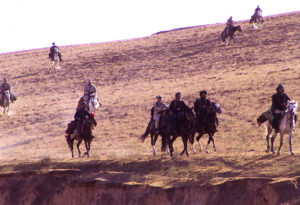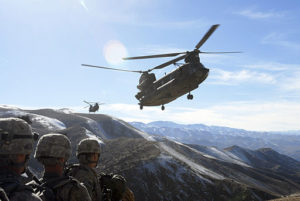
In terms of development, the U.S. has spent over $100 billion in Afghanistan, which is more than the U.S. spent on the Marshall plan in Europe after adjusting for inflation. As Wissing notes this is a staggering amount of money for a nation of 30 million people. Worse, he suggests that a significant portion of those development funds were siphoned off to fund the Taliban itself. He argues that the projects that the U.S. has funded have been divorced from Afghan reality, and unsustainable for that reason. The entire history has been a textbook lesson in how not to do development, he suggests, in part because policy has been driven by the personal, career and institutional needs of those people dispersing the funds.
An entire generation of U.S. soldiers have fought in Afghanistan since 2001. Most years I have had one or two veterans in

At the same time, I think that Wissing is correct that this is not a burning issue for most people in the United States. Even in my classes when my students are discussing security and foreign policy, they tend not to spend a lot time on the conflict. It’s fought by professional soldiers not conscripts. This fact has made it a very different conflict than Vietnam, in terms of how it has affected civilians’ lives. While my students oppose the war, they also aren’t out in the streets protesting it. They appear to more interested in Snowden and Wikileaks than events in Kandahar.
It’s hard to see this war ending well. As Wissing says, the Taliban is making headway, the Afghan government is corrupt, and there is no evidence that another surge could fundamentally change the dynamic of the war. Still, as the Taliban strengthens, there are calls in Washington to send more troops. Everyone weighing this issue should first listen to this podcast.
It is truly remarkable that in a sixteen year conflict with one of poorest nations on the planet, the wealthiest nation on the earth was unable to prevail. This is true despite the fact that Afghanistan had already been exhausted by a lengthy war with the Soviet Union, while the United States has spent far more on its military during this period than any other nation on the planet, by a wide margin. When I read articles in military journals about counter-insurgency strategy they all seem to me to have an air of unreality about them, because they don’t adequately acknowledge that the Afghan war has been an utter debacle. In this context, discussing counter-insurgency (COIN) strategies is rather like packing snowballs onto melting glaciers.
I wonder if Spanish thinkers felt the same about the 80 years war, given the immense human and financial costs of trying to hold onto the Netherlands. Did they hear Spain’s military leaders argue that a surge was needed to protect all that they’d fought for? Did they worry that the government was basing its decisions on sunk costs? Did they fear that Spain’s immense wealth from the American colonies had blinded its leaders to strategic reality? And when Spanish soldiers returned from the Netherlands, were they quiet and alienated and cynical?
Shawn Smallman, 2017.
